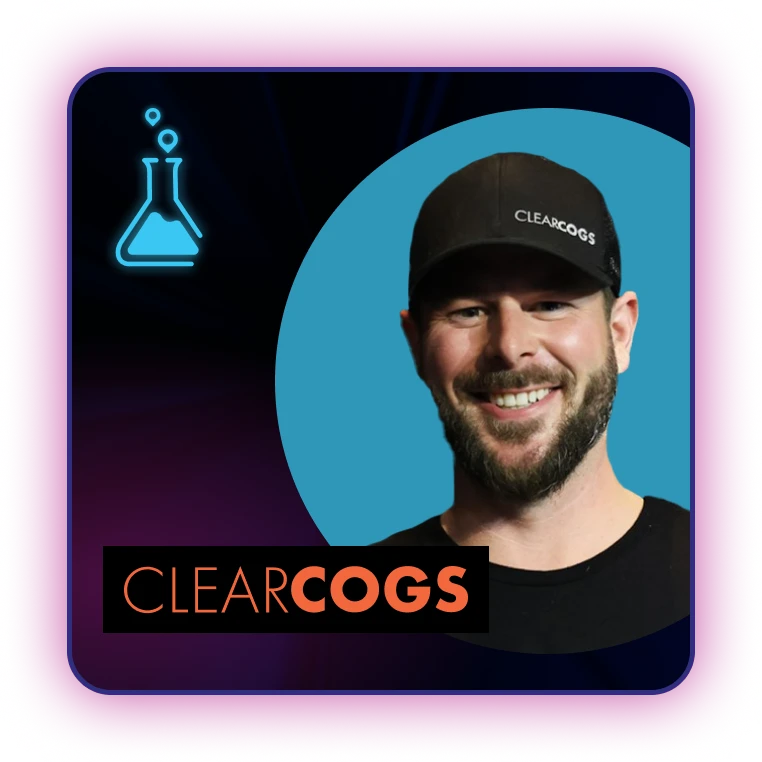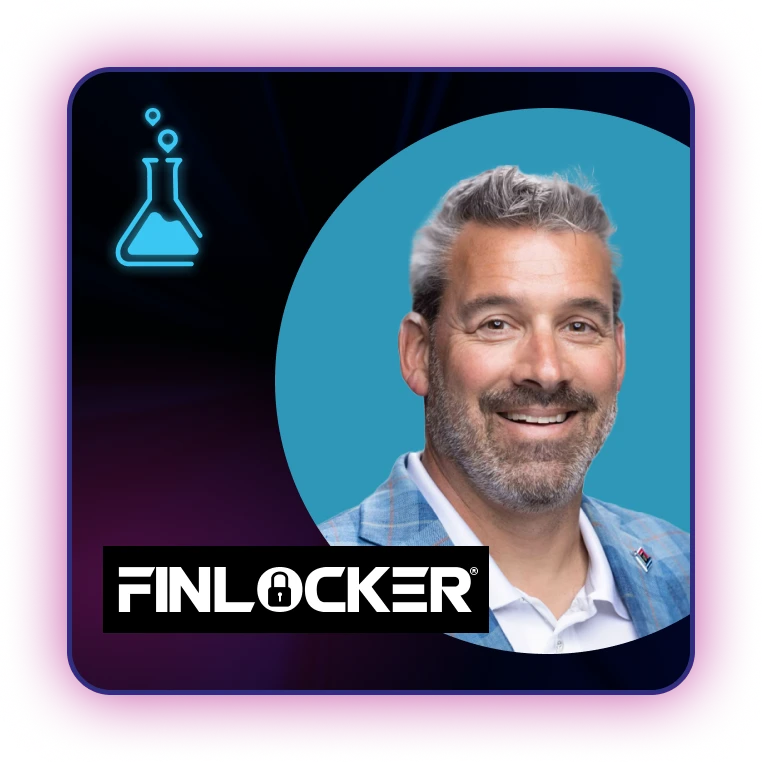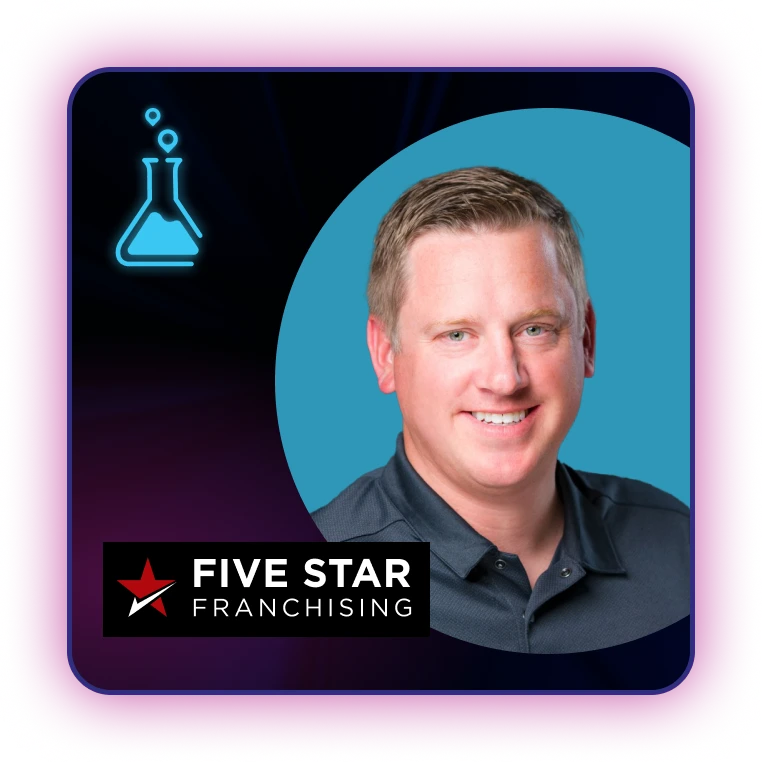< All episodes

January 17, 2024
Changing the game with innovative marketing
with Shashank Shekhar
Founder & CEO of InstaMortgage
Summary
In this episode of The Local Marketing Lab, Justin Ulrich sits down with Shashank Shekhar, an expert in financial services and mortgage industry marketing. With over 20 years of experience, Shashank provides invaluable insights on driving growth and revenue by constantly adapting and implementing innovative marketing into your strategy.
Anticipate changing consumer preferences. Shashank emphasizes anticipating where your customer preferences are heading, not just where they are today. By blogging early on trending platforms in 2009, he adapted his mortgage marketing strategy to reach evolving consumers. Tracking preferences helps you pivot marketing appropriately.
Look outside your industry. Looking beyond just your industry for new ideas to apply to your business. Shashank studied Amazon’s exceptional Prime experience and worked to bring similar convenience to mortgage consumers. Thinking broadly sparks innovation.
Overcome fear of failure. Overcoming the fear of failure and rejection to constantly test innovative ideas. For example, Shashank stuck with content marketing for 6 unsuccessful months before gaining traction. Failing forward faster helps you learn.
By applying these frameworks for innovation and local marketing growth, you can leave competitors behind and connect with changing consumer needs. Tune in to gain these invaluable insights!
Key Takeaways
Here are some topics discussed in the episode around innovative marketing:
- Understanding and anticipating changing consumer preferences
- Looking outside your industry for new ideas
- Overcoming fear of failure to try new things
- The impact of AI and digital transformation in the mortgage industry.
Constant innovation is the key to be successful here.
SHASHANK SHEKHAR

Resources
- Connect with Shashank Shekhar on LinkedIn.
- Learn more about InstaMortgage.
- Listen to an episode of the Shashank Redemption podcast.
- Check out Shashank’s books on Amazon.
Transcript
Justin Ulrich
What’s up everyone, and welcome to the Local Marketing Lab, where you get real-world insights from industry pros to help you drive local revenue and local for growth. This podcast is brought to you by Evocalize – digital marketing tools powered by local data that automatically work where and when your locations need it most. Learn more at evocalize.com.
What’s up? And welcome to the Local Marketing Lab. Joining us in the lab today is a guest with more than 20 years of experience in the mortgage industry. He was named the Stevie Awards Entrepreneur of the Year and is a number one bestselling author on Amazon for books like First Time Home Buying 101, Real Estate Unleashed, and the latest number one bestseller, My First Home.
He’s a host of Shashank Redemption podcast and the founder and CEO of InstaMortgage, Shashank Shekhar. Thanks for joining us in the lab, my friend.
Shashank Shekhar
Thanks, Justin. Quite an intro there. You did your research.
Justin Ulrich
Yeah, I like to do a little bit and not come into these things dark, but it usually pays off.
Shashank Shekhar
No, it does. Of course. Thanks for that beautiful intro.
Justin Ulrich
You bet. Well, thanks for being so awesome and making the intro interesting by what you’ve done with your background. I guess as I was kind of familiarizing myself with your background, I got sucked right in to your podcast. The name, I think, is so clever. Shashank Redemption.
Shashank Shekhar
It is. It’s funny. I was doing my MBA in India and then one of my friends told me about the movie, and that was several years back, of course, a couple decades back. And I was like, oh, that’s interesting. And then I come to the US and then everybody talks about that movie, of course. It’s like, I got to watch this thing and it’s an amazing movie, which is a good thing. You don’t want your name associated with a movie that sucks. So that’s a good thing.
And then sometimes I think that’s a lesson in branding, is that you take something which is already very popular and try to build your brand around it with a clever take on it. So when I launched the podcast with that name, I literally got, if you look at my, I think LinkedIn or Facebook, when I announced the launch, there are dozens and dozens, if not hundreds of comments on how cool they thought the name was. So that’s gone pretty well.
I have actually expanded into doing a newsletter with that name that goes to about 15,000 industry professionals. It’s a free newsletter, but they subscribe to it and I send it over. So, yeah, happy how the name has caught up and caught on with the people. So sometimes you do a clever take. You’re never too sure how will it pan out. But I think it has gone on well.
Justin Ulrich
That’s true. Well, you definitely have some good content. So at the end of the show, if listeners want to go to the show notes, we’ll link to your podcast as well as you can shoot me a link to your newsletter. We’ll get that in there as well.
Shashank Shekhar
Sure. Thanks.
Justin Ulrich
Yeah, I guess kind of kick things off. It would probably be good for listeners to understand a little bit about your background and maybe what your team is doing over there at InstaMortgage.
Shashank Shekhar
Yeah, my background, I’ve been in the financial services, as you mentioned, 20 plus years. Not exactly in mortgages, but in the financial services. Out of my business school, I went to work for GE Capital. They had a consumer finance division. I was working for them and then went on to work for a startup, which in India, which was in the US mortgage space, came to this country in about 2007 to head the business for them.
And then 2008 happened, or late 2007 happened. We were a VC funded company at that point. Lost all the funding, shut down the company. I didn’t own it, I was still an employee, but I was employee number two there, so had quite a lot of a stake in the company.
And then I was literally brand new in the US at that point in time, less than 18 months in the country, knew practically three people in the entire country, and those three people were my coworkers from the company that just got shut down. And the year was 2008, but I was like, what the heck?
I came to the US because eventually I wanted to start something of my own. And I know it’s not a good year. I know that I don’t know anyone in the entire country. I know that I literally have no savings, so to say. But I’ll still give it a shot because I was kind of entrepreneurial from that perspective. And it was like, what’s the worst that will happen if nothing works? We’ll figure out something in a year or so.
So that’s how I got in the business. I had a broker license in California at that time and started a one-person brokerage shop with the name Arcus Lending. Back then we rebranded or changed our name to InstaMortgage a couple of years back. And that was more to give credence to what we were doing.
We were one in terms of a speed. We closed loans almost 50% faster than the industry average. And in terms of technology, we are one of the most innovative and tech forward company in the country. We recently launched Insta AI, which is one of its kind AI platform, at least as far as I know. There’s only probably one mortgage company. Rocket had something similar, but other than that, nobody else has it.
So InstaMortgage really kind of signifies or communicates our message of speed and technology better than what Arcus could. And again, I think just like Shashank Redemption I said before, people have really liked our rebranding, so to say, to InstaMortgage, which shows what we are doing very well. So that’s what we do at InstaMortgage. We are a residential mortgage company. At the core of it, we are an independent mortgage bank, but very innovative and really take forward in terms of what we do here.
Justin Ulrich
Very cool. Man, that’s a cool story coming over. Not knowing anybody, starting a company in 2008, that sounds like the riskiest endeavor ever, but it looks like it paid off.
Shashank Shekhar
Yeah, of course, like with anything else, nothing paid off overnight. It took a lot of a struggle. But also, I think the reason why it paid off, Justin, if you want to call it that, is mostly because at every stage of my career I have tried to figure out things which are not common and not usual. Like even in 2008, for example, when I struggled for several months, which was understandable, everybody was struggling. And of course, especially because given all the headwinds I had at that point in time.
But in about a year or so, I figured out that all the way that loan officers and mortgage brokers were getting business then wasn’t really suitable, both for the kind of environment that we were in and just me personally, I’m not a very extrovert person who will go and network with real estate agents and get their business.
So I started blogging in April May of 2009 when there were less than ten people in the industry that were blogging. But I could see that the consumer preference was moving online. I was in Silicon Valley, where of course those guys are early adopters, so to say, of what the tech trends are. I started taking online application in 2008 when it was nearly unheard of. Nobody was taking online loan applications back then.
So I customized my marketing and my technology and my process to the demographic that I was serving here. Even then it took a lot of time, but at least I started looking at doing business very differently than where rest of the industry was. And I’ve tried to do that. Reinnovate ourselves, rebranding to InstaMortgage, focus on AI, a lot of that is also, again, so to say, is reinnovating or innovating ourselves over and over again.
And that’s I think is critical. Irrespective of your size, whether you are a single person loan officer, a mortgage broker with a couple of loan officers, or the large mortgage lender, I think this industry requires you. This is one of the toughest industries there is, and that is because of how difficult the business becomes when it seems as if it has become easier. So constant innovation, I guess, is the key to be successful here. And I’m thankful that that’s the kind of company we are. We are a very forward moving, constantly innovating kind of a, kind of an organization.
Justin Ulrich
Yeah. You have brought up a bunch of good points we’ve had in multiple episodes. We talk about the importance of just knowing your customer base and understanding them and being able to communicate with them in a way that resonates.
You understood your customer base, you understood their journey, where trends were going, where they were looking for information, how they would engage with a company like yours to get a mortgage, and you pivoted. It’s one of the things that absolutely, you can’t get stuck on your heels. Like, once you find something that works, doesn’t mean that that’s going to work forever. You have to constantly innovate like you’re talking about.
Shashank Shekhar
No. Yeah, and totally, that’s marketing 101. But a lot of people fail at that. A lot of large companies fail at that. Sometimes people think, oh, I’m just a one person loan officer. What do I know about marketing? You’ll be surprised. Fortune 500 companies get that wrong all the time, which is not understanding their audience and not understanding their customers very well.
When I go to large events or conferences, I speak, especially early in my career, I used to tell them the same thing is, look, just because I started taking online application in 2008 doesn’t mean that you should as well. Maybe your customer base does not like that for you. That might be more a disadvantage than an advantage, is because maybe they want to sit across the table, they want to fill up the application on the paper, maybe not in 2024, I’ll be surprised if their customers still want it.
But if they do, if that’s the kind of demographic that you serve, that’s the kind of consumer preference that you have, then that’s how you serve. Because that’s marketing 101, is that you need to understand what your consumer preferences are, not just today, but where it’s moving. So you need to plan for the present, but you as much need to plan for the future as well.
That’s why the kind of investments that we are doing with the AI technology is because of the same thing, is because we genuinely believe that it’s once in a generation kind of a technology that can completely revolutionize consumer experience in the future.
And that’s why whatever size or scale that you are at both in terms of marketing and technology. Understanding your consumer preferences and understanding where it’s moving is very important because otherwise it’s not about how good your technology or how good of your marketing is. It’s about is it serving the need and it’s solving a real pain for your customer segment that you target.
Justin Ulrich
Yeah, very good. Yes. It makes me think about too, you’re reading the signals from your customers in terms of how they want to engage with your brand and identifying also trends that are out there and testing new things. Because again, if you’re not testing new things and trying to move in the direction of your customer base, they’re going to leave you behind.
The only way to do that to keep up is to continually test and don’t get kind of static in what you’re doing in your approach to communicating with your customers.
Shashank Shekhar
Yeah, testing, that’s a great point, Justin, is that you don’t get everything right, but you won’t know what will work, what won’t until you test it. Sometimes you have to test things way longer. Sometimes you can’t give up something that quickly.
I’ll give you the blogging example. In 2009, when I started blogging, I was writing two or three blogs a week for six months straight before I got my first call. Most people would have quit by then because they’ll be like, oh, this thing doesn’t work. Nobody reads my blog post.
But I was so convinced that the content strategy, educating your clients and on a platform that I thought the consumers were moving to was the right strategy that I stuck on it or I kept at it for very long, much longer than most people would probably continue for. And then I get my first call from a client. Just a conversation, nothing that ended in closing alone.
But then a couple of weeks later, I get a call from an editor at Yahoo News who was doing an article on mortgages. And he found me online and then he referred me to other editors at Yahoo News. So things have started moving again. Nothing happened overnight. And even after those calls, it’s not as if overnight I started getting a ton of calls or emails.
But what I’m trying to say is that you need to test. Sometimes you have to test some stuff longer, like content strategy. For example, whether you were doing it in 2009 or you’re doing it in 2024, that will take some time. I mean, we are not making 300 million dollar movies that hits theaters and either is a blockbuster or not. These are content strategies where you have to build your audience and you have to see, even in terms of content, what works, what doesn’t.
And you have to move along like that. So testing is a very important part of anything that you do. Whichever sales technique that you use or a marketing technique that you use, you have to constantly test it. Sometimes things that, for example, newsletter.
I mean, I never thought anybody wants to read a newsletter or something, and I started doing that earlier this year, March or April, I think. And we have a 40% open rate on newsletters, which is almost unheard of. Even some of the biggest newsletters in the world barely get to 18, 19% open rate. So I wouldn’t know that unless I tested it, right. And if it didn’t do well, it didn’t do well. That’s okay. You want to scrap it after a few months, not the best use of your time. You can do that.
But you won’t find that until you tried something. The problem with the industry, and a lot of people really, is that the problem is with the inertia, right. Is that we are either used to doing something the same way or we just are stuck. We just don’t think of innovative ideas. And more importantly, we don’t want to be out there testing it because we feel that we’ll get rejected or judged or this thing won’t work.
That fear of failure or fear of rejection is what keeps us maintaining this status quo. But that’s not how you grow. Especially as I said, mortgage industry is probably one of the toughest industries, not just in the country, but probably in the world. It’s just a very difficult industry to be in. So constantly testing, constantly innovating is probably the only way to grow.
Justin Ulrich
You nailed probably 20 things that I’ve talked about in other episodes in other industries. It is all true, and it’s across the board. No matter what industry, if you think, like, if you’re listening right now, think to yourself how often you have inspiration to do new things just to try something, or how often you see something that someone else is doing that you’re not doing.
And then also be introspective and think, how long have you been seeing those ideas doing nothing different? And at the end of the day, the people who are trying new things and who are moving forward are going to be the ones who continue to succeed, and you will continue to be in the same spot that you are today. If not, you’ll fall backwards. If you’re not moving forward, because everyone else will leave you in the dust.
Shashank Shekhar
Yeah. And that’s where I think you mentioned something important, Justin, is that’s where people should be watching podcasts like this where you don’t only talk about mortgages and that’s important. The multidisciplinary approach to learning is probably the most important.
And the best way to learn is that if you’re only focused on your industry all the time, I’m not saying that’s a bad thing. Of course you should learn more and more about your own product and your industry. But you’ll be surprised. Most of the ideas actually comes from other industries, what other people are doing. And that’s where you should be watching podcasts like this or reading books, which is not about your industry or whichever way you learn it.
For me, watching podcasts or listening audiobooks and I just listen ton of it, reading blogs, watching some videos, those are some of my best ways to learn. But whatever your way of learning is, multidisciplinary approach to learning is the most effective way of learning. That’s what gets your ideas going is that, oh, how come blogging works in this industry, but it’s the same audience, why wouldn’t it work in the mortgage side of it?
Or how does this industry solve the problem using AI? How come we are not solving it? So a lot of ideas, because we as an industry are not that innovative. So most of the ideas you would probably not find in the mortgage world. And when you find it, you’ll be like, oh, now everyone’s doing it. I’m probably too late to this thing is because we wait for a lot of things to actually work well before someone wants to give it a shot.
But if you’re constantly keeping your eyes and ears open into what’s happening in other industry, how are people succeeding there? What kind of new ideas they are trying that just keeps you from a cognitive perspective, from an idea new idea generation perspective, you’re constantly active, you’re finding something new. Some of those may work in our industry, some of those not.
Because, Justin, one of the concepts that I have been talking about for now, four or five years is building Amazon-Prime-like experience for the mortgage consumers. Now, we don’t have Amazon-Prime-like experience in the mortgage industry. So if I was not observing that or watching that, or seeing how Bezos built an entire Amazon-Prime-like experience for Amazon, we will never be thinking about copying a similar experience for mortgages.
And sometimes maybe completely ignoring it, saying, I mean, Bezos sells toothbrush and toothpaste. We are trying to sell mortgages here. How can the two experience even be equal? Maybe not on day one, but if you’re really passionate about it, you start thinking about it. Maybe not 48 hours delivery, but maybe seven day close. And that’s what got us from leads to clear to close in 6 hours, which is an industry record in the history of mortgages in the US is because that’s where I get my learning from.
It’s like I’m looking at what is Amazon doing from consumer experience perspective, right? What is Uber doing? What is everybody else doing? And sometimes you’ll be like, oh, we are a very small company and we can’t do that. A lot of it is just process improvement. You’ll be surprised. It’s not a lot of that. Oh, I need to have multi million dollars to build new piece of technology to facilitate consumer experience like that.
A lot of it is mindset and process improvement that you can do with very small teams. You don’t need large teams in large budget. So great point about talking about things from other industries is because that’s how you learn.
Justin Ulrich
Yeah. If you don’t, you’re sitting, basically, if you just stay within your industry, you’re sitting inside this echo chamber that everyone else is just repeating the same things and it just becomes a lot of clutter that you have to figure out how to cut through. And a way to cut through is to bring in those new innovative solutions and content types and marketing tactics that aren’t typically seen within the industry. And it stands out and sets you apart from everybody else.
But I think the key thing is you mentioned this earlier too, and we talk about it a lot. You are the one that gets in your own way of trying and succeeding. And typically it is the fear of rejection, the fear of failure, putting yourself out there publicly and flopping.
I did that. It took me forever to start a podcast because I was thinking, well, what’s my mom going to say? What are my buddies going to say? But at the end of the day, it’s been real successful and it’s been awesome to have conversations like this with you bringing new ideas from different industries. And it’s like, it’s actually helped me innovate my own marketing as a marketing leader.
So if you’re in this echo chamber, you’re kind of doing yourself a disservice. Step out of your comfort zone, find out what works and try new things.
Shashank Shekhar
No. Yeah, there reminds me of a Japanese proverb. It says, the frog in the pond doesn’t know that an ocean exists out there. It’s a similar thing. Right? If you’re in the echo chamber or chamber of the mortgage industry or whatever industry that you’re part of, irrespective. If that’s all you do, that’s all the conferences you go to, that’s all the publications you read, that’s all the podcasts you watch, then you don’t know there’s an ocean out there, right, where you can get your ideas from.
And talking about starting a podcast, if you listen to the first episode of my podcast, the entire episode is about trying something new. And I talk about the fact that how this experience of now starting a podcast, for me is trying something new, something that I have done all my life, from where I was born to constantly, every few years, I had to do something new to be where I am, to be here where I am.
And that’s something which is after a point of time. It’s like building new neurons, right, and building new connections to your neurons. The more you hardwire your brain into trying something new, the less you have fear of rejection. It does not always mean that you have less of a failure. You could still get a lot of things wrong.
We had a really big initiative this year that bombed, which I thought was really game changing and everything, but I’m not afraid to, one, admit it, and two, to say that I still failed stuff is because that’s the process of trying something new. That’s the process of learning and giving it a shot. But it’s better to do that and fail at something and then learn from it and try something new, which hopefully you’ll succeed at, versus not trying anything at all. So that is a guaranteed way to fail in the long run, for sure.
Justin Ulrich
100%. And failure, like you said, it’s not always negative. Failure is learning. You fail forward into what actually works, and you continue to innovate with those learnings.
One of the things, Shashank, that when I was digging into your background, I noticed that not only did you start your company in 2008, which I thought was, oh, man, that one must have been so tough, but you innovated in tough times then, and in 2020, you also innovated during a really hard time in developing the first AI for mortgage. Is that correct?
Shashank Shekhar
That is correct. So people talk about AI all the time. And when we did the Insta AI launch a couple of weeks back, basically the presentation was like, look, we have been doing this much longer than most people have talked about. We built or we created the first digital human in the mortgage industry in the world, not just in the US.
It was a first of its kind, and it’s a serious upgrade. This is not an easy technology to build so we are talking the same technology on which Siri and Alexa were built. So it’s a conversational AI platform, so to say, but it’s created as a human. So it’s a serious upgrade from a Siri and Alexa experience where you can only talk using voice.
But Rachel, our first digital human in the mortgage industry, actually represents herself. She looks like a human, she talks like a human, even expressions on the face that convey emotion, which is very hard to do in a digital human space. So this is not your avatar from, say, 2005. This is like, serious AI platform, which is very futuristic.
So much so that we were planning to have a really major play in the Metaverse, which didn’t take off, but as and when that happens, Rachel could be our spokesperson, so to say, in the Metaverse space for that. So we have done AI long time back, but of course, what is happening with AI now is very revolutionary and something that can take our experience to a very different level.
But that just goes back to our point, is that we have just been constantly innovating, sometimes just to learn something, even though it may not have any practical, you’d say tomorrow. But if you are early in the game, if you are ground zero into something, then when the first floor and the second floor and third floor gets built, you’re already in the building.
It’s much easier to climb up these stairs than to say, oh, now I want to get into a third floor when there are already, say, occupants already there on the first floor and the second floor and everything. So you’re very late in the game, because, again, it’s a fear of failing.
Sometimes we’re like, oh, we don’t want to touch anything unless it’s stable, unless we know that this thing works, unless we know exactly how it works. But then also, you are 10th in the game, hundredth in the game, millionth in the game. Sometimes you’re very far behind. Sometimes you need to take a risk on some technology. And we genuinely believe AI, AI is such, and that’s why we were very early, if not probably the earliest in the industry, multiple industries combined. We were one of the first.
Justin Ulrich
Very cool. Yeah, it’s a good analogy. Coming in on the first floor. I envision you actually coming in at the basement floor just like Tony Stark as he was building Jarvis. I got an image here. You building this in your lab and your Tony Stark get up. But anyways…
Shashank Shekhar
This is so cool. I’m going to use this.
Justin Ulrich
Yeah, I’ll get it over to you. It was kind of fun to pull together AI has its own quirks, as you know, like with generating images and hands. But this picture had like 20 fingers, so it took a fair amount of doctoring afterward to try to get your hands to write.
Shashank Shekhar
Okay. It always gets the hands wrong on the AI for some reason. But I like the background and the visual. It looks like somebody who’s looking into the future and building something cool. So I really like this picture. So it’s not just from how it looks, but the overall, I think the theme of the image kind of gels very well with me as a person. So thank you. This is amazing.
Justin Ulrich
Very cool. You bet. Yeah, I’ll get that over to you. Well, hey, Shashank, before we jump off, how can folks follow you? Follow your brand, follow your podcast?
Shashank Shekhar
Yeah, LinkedIn is the social media platform where I’m most active. So I’m present on all other platforms, but that’s where I’m most active on. So if you’re on LinkedIn, please follow, connect with me there. Should be easy to find. My first name plus last name combined makes it one of the unique names definitely in the country, if not the world.
And then my podcast is Shashank Redemption. It’s on Apple and Spotify. So subscribe to that if you’d like to. If you are in, again, multidisciplinary approach to learning, as I was saying, I don’t talk about mortgages. In fact, I talk very little about mortgages. It’s mostly about talking with founders and CEOs of other companies across the world, actually, who are doing some cool stuff with what they’re doing. A lot of them are proptech and fintech space.
So would love for you to take a listen and then I’ll send a link to Justin. Of course, he might be able to drop the newsletter link. That’s mostly for the real estate and mortgage space, though. So depending on what your interest looks like, hopefully there is a space for us to connect and know about each other a little bit more.
Justin Ulrich
Very cool. As you’ve heard on this episode, Shashank is a great individual. He has awesome insights. I’ve listened to a couple of the episodes on his podcast, Shashank Redemption. Check it out. Check out the link in the notes to the newsletter. Subscribe. Shashank, thank you so much for joining us in the lab, my friend.
Shashank Shekhar
Justin, it was a pleasure. I mean, it’s very rare that you get to talk about so many different of ideas and concepts in less than 30 minutes of recording. So you’re an amazing interviewer and should pat yourself on the back for starting this podcast from a fellow podcaster.
Justin Ulrich
I appreciate it. Thanks again.
Shashank Shekhar
Thanks, Justin.
Justin Ulrich
As always, thanks for joining us in the Local Marketing Lab. This podcast was sponsored by Evocalize. To learn more about how Evocalize can help you grow your business, visit evocalize.com.
If you learned something from today’s episode, don’t forget to subscribe on your favorite podcast platform and follow us on LinkedIn and Facebook @Evocalize. That’s Evocalize and on X at Evocalize.
And remember, keep innovating and testing new things. You’ll never know what connects with your customers best unless you try. Until next time. Thanks for listening.

Shashank Shekhar
Founder & CEO of InstaMortgage
Meet Shashank Shekhar
Shashank Shekhar is an award-winning entrepreneur and author who has led his mortgage company, InstaMortgage, to become one of the fastest-growing private firms in America. After launching his business in 2008, he has grown it by relentlessly focusing on customer service, education, and constant innovation.
Named Entrepreneur of the Year and bestselling author on Amazon, Shashank also hosts the popular Shashank Redemption podcast and created Rachel, the world’s first digital human in the mortgage industry. His mantra of anticipating consumer trends and overcoming fear of failure has fueled his success.

Justin Ulrich
VP of Marketing at Evocalize
Meet the host
Justin is a seasoned marketing leader known for his creative expertise and innovative go-to-market strategies. With vast experience spanning both B2B and B2C landscapes, Justin has made his mark across a spectrum of industries including software, POS, restaurant, real estate, franchise, home services, telecom, and more.
Justin’s career is steeped in transformative strategies and impactful initiatives. With specialties ranging from channel marketing and brand management to demand generation, his strategic vision and execution have consistently translated into tangible results.
Empower your franchisees.
Drive real local results.
Not every franchisee on your team is a marketing pro — yet.
Let’s change that. Reach out, and we’ll show you how!












